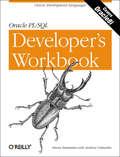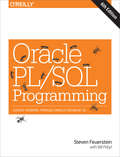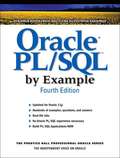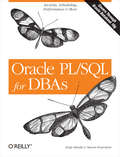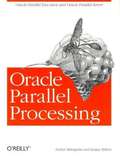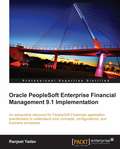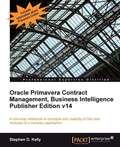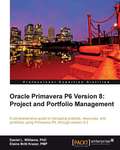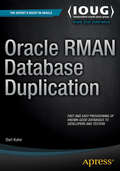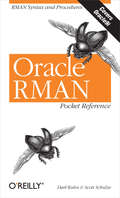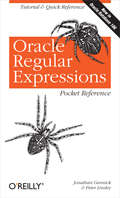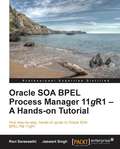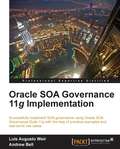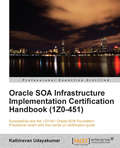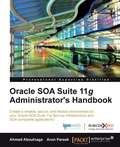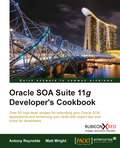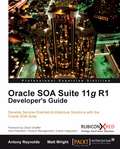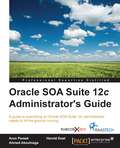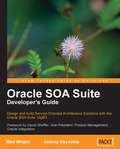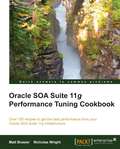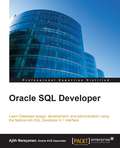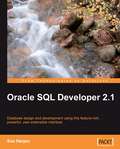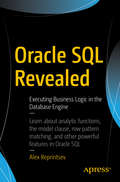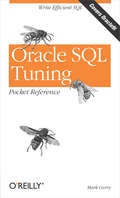- Table View
- List View
Oracle PL/SQL Programming: A Developer's Workbook
by Steven Feuerstein Andrew OdewahnHowever excellent they are, most computer books are inherently passive--readers simply take in text without having any opportunity to react to it. The Oracle PL/SQL Developer's Workbook is a different kind of animal! It's designed to engage you actively, to get you solving programming problems immediately, and to help you apply what you've learned about PL/SQL--and in the process deepen your knowledge of the language. By tackling the exercises in this workbook, you'll find yourself moving more rapidly along the learning curve to join the growing ranks of PL/SQL experts. The Oracle PL/SQL Developer's Workbook is a companion to Steven Feuerstein's bestselling Oracle PL/SQL Programming and his other PL/SQL books from O'Reilly. It contains a carefully constructed set of problems and solutions that will test your language skills and help you become a better developer--both with PL/SQL and with other languages. Exercises are provided at three levels: beginner, intermediate, and expert. The workbook exercises cover all the major features of PL/SQL, including those new to Oracle8i (e.g., Java and web features, autonomous transactions, and bulk binds). You'll find chapters on: Basic language elements--variables, naming, loops, conditional and sequential control, exception handling, and records. Data structures--index-by tables, nested tables, variables arrays (VARRAYs), and object technology. Database interaction--cursors, DML and transaction management, cursor variables, and native dynamic SQL Program construction--procedures, functions, blocks, packages, database triggers, and calling PL/SQL functions in SQL. Built-in functionality--the character, date, conversion, numeric, and miscellaneous functions, and the DBMS_SQL, DBMS_PIPE, DBMS_OUTPUT, UTL_FILE, and DBMS_JOB built-in packages. Miscellaneous topics--using Java with PL/SQL, external programs, PL/SQL web development, tuning PL/SQL, and PL/SQL for DBAs.
Oracle PL/SQL Programming: Covers Versions Through Oracle Database 12c
by Steven Feuerstein Bill PribylConsidered the best Oracle PL/SQL programming guide by the Oracle community, this definitive guide is precisely what you need to make the most of Oracle’s powerful procedural language. The sixth edition describes the features and capabilities of PL/SQL up through Oracle Database 12c Release 1.Hundreds of thousands of PL/SQL developers have benefited from this book over the last twenty years; this edition continues that tradition. With extensive code examples and a lively sense of humor, this book explains language fundamentals, explores advanced coding techniques, and offers best practices to help you solve real-world problems.Get PL/SQL programs up and running quickly, with clear instructions for executing, tracing, testing, debugging, and managing codeUnderstand new 12.1 features, including the ACCESSIBLE_BY clause, WITH FUNCTION and UDF pragma, BEQUEATH CURRENT_USER for views, and new conditional compilation directivesTake advantage of extensive code samples, from easy-to-follow examples to reusable packaged utilitiesOptimize PL/SQL performance with features like the function result cache and Oracle utilities such as PL/Scope and the PL/SQL hierarchical profilerBuild modular, easy-to-maintain PL/SQL applications using packages, procedures, functions, and triggers
Oracle PL/SQL Programming: Oracle Development Languages
by Steven Feuerstein Andrew OdewahnHowever excellent they are, most computer books are inherently passive--readers simply take in text without having any opportunity to react to it. The Oracle PL/SQL Developer's Workbook is a different kind of animal! It's designed to engage you actively, to get you solving programming problems immediately, and to help you apply what you've learned about PL/SQL--and in the process deepen your knowledge of the language. By tackling the exercises in this workbook, you'll find yourself moving more rapidly along the learning curve to join the growing ranks of PL/SQL experts.The Oracle PL/SQL Developer's Workbook is a companion to Steven Feuerstein's bestselling Oracle PL/SQL Programming and his other PL/SQL books from O'Reilly. It contains a carefully constructed set of problems and solutions that will test your language skills and help you become a better developer--both with PL/SQL and with other languages. Exercises are provided at three levels: beginner, intermediate, and expert. The workbook exercises cover all the major features of PL/SQL, including those new to Oracle8i (e.g., Java and web features, autonomous transactions, and bulk binds).You'll find chapters on:Basic language elements--variables, naming, loops, conditional and sequential control, exception handling, and records.Data structures--index-by tables, nested tables, variables arrays (VARRAYs), and object technology.Database interaction--cursors, DML and transaction management, cursor variables, and native dynamic SQLProgram construction--procedures, functions, blocks, packages, database triggers, and calling PL/SQL functions in SQL.Built-in functionality--the character, date, conversion, numeric, and miscellaneous functions, and the DBMS_SQL, DBMS_PIPE, DBMS_OUTPUT, UTL_FILE, and DBMS_JOB built-in packages.Miscellaneous topics--using Java with PL/SQL, external programs, PL/SQL web development, tuning PL/SQL, and PL/SQL for DBAs.
Oracle PL/SQL by Example (4th edition)
by Benjamin Rosenzweig Elena Silvestrova RakhimovUsing hands-on labs, extensive examples, exercises, and projects, this tutorial teaches basic PL/SQL concepts and general programming fundamentals, covering conditional and iterative program control techniques, error and exception handling, working with cursors and triggers (including Oracle 11g's new compound triggers), and working with advanced PL/SQL capabilities such as object-relational features and bulk SQL. Appendices offer a PL/SQL formatting guide, sample database schema, and an ANSI SQL standards reference. Rosenzweig is a software development manager. Rakhimov is a software developer. Annotation ©2008 Book News, Inc. , Portland, OR (booknews. com)
Oracle PL/SQL for DBAs: Security, Scheduling, Performance & More
by Steven Feuerstein Arup NandaPL/SQL, Oracle's powerful procedural language, has been the cornerstone of Oracle application development for nearly 15 years. Although primarily a tool for developers, PL/SQL has also become an essential tool for database administration, as DBAs take increasing responsibility for site performance and as the lines between developers and DBAs blur.Until now, there has not been a book focused squarely on the language topics of special concern to DBAs Oracle PL/SQL for DBAs fills the gap. Covering the latest Oracle version, Oracle Database 10g Release 2 and packed with code and usage examples, it contains:A quick tour of the PL/SQL language, providing enough basic information about language fundamentals to get DBAs up and runningExtensive coverage of security topics for DBAs: Encryption (including both traditional methods and Oracle's new Transparent Data Encryption, TDE); Row-Level Security(RLS), Fine-Grained Auditing (FGA); and random value generationMethods for DBAs to improve query and database performance with cursors and table functionsCoverage of Oracle scheduling, which allows jobs such as database monitoring andstatistics gathering to be scheduled for regular executionUsing Oracle's built-in packages (DBMS_CRYPTO, DBMS_RLS, DBMS_FGA, DBMS_RANDOM,DBMS_SCHEDULING) as a base, the book describes ways of building on top of these packages to suit particular organizational needs. Authors are Arup Nanda, Oracle Magazine 2003 DBA of the Year, and Steven Feuerstein, the world's foremost PL/SQL expert and coauthor of the classic reference, Oracle PL/SQL Programming.DBAs who have not yet discovered how helpful PL/SQL can be will find this book a superb introduction to the language and its special database administration features. Even if you have used PL/SQL for years, you'll find the detailed coverage in this book to be an invaluable resource.
Oracle Parallel Processing
by Tushar Mahapatra Sanjay MishraThese days, databases often grow to enormous sizes, straining the ability of single-processor or single computer systems to handle the load. More and more organizations are turning to parallel processing to give them the performance they need. Oracle Parallel Processingis the first book to describe the full range of parallel processing capabilities in the Oracle environment. It demystifies the features and benefits of Oracle parallel processing, the various parallel architectures, parallel execution feature
Oracle PeopleSoft Enterprise Financial Management 9.1 Implementation
by Ranjeet YadavThis step-by-step tutorial will take you through Oracle PeopleSoft Financial Management 9.1 and show you how to implement it into your business. It is written in an easy-to-read style, with a strong emphasis on real-world, practical examples with step-by-step explanations.This book will establish a solid foundation for your efforts to become a successful PeopleSoft Financials practitioner. If you are a functional implementation analyst, a business analyst, or a business user who plans to start using PeopleSoft applications, this book is for you. Reading this book will equip you with the basic skills to configure and maintain PeopleSoft financial applications.
Oracle Primavera Contract Management, Business Intelligence Publisher Edition v14
by Stephen D. KellyThis book is packed with real world examples that cover concepts and usability of the core modules of a complex application. If you are Project manager or consultant looking forward to using and implementing Oracle Primavera Contract Management in your organization, then this is the best guide for you. No prior knowledge of PCM required.
Oracle Primavera P6 Version 8: Project and Portfolio Management
by Daniel Williams Elaine Britt KrazerThis book is written in simple, easy to understand format with lots of screenshots and step-by-step explanations. If you are a Project manager or a consultant, who wants to master the core concepts of Primavera P6 and the new features associated with version 8, then this is the best guide for you. This book assumes that you have a fundamental knowledge of working in the Primavera P6 environment.
Oracle RMAN Database Duplication
by Darl KuhnRMAN is Oracle's flagship backup and recovery tool, but did you know it's also an effective database duplication tool? Oracle RMAN Database Duplication is a deep dive into RMAN's duplication feature set, showing how RMAN can make it so much easier for you as a database administrator to satisfy the many requests from developers and testers for database copies and refreshes for use in their work. You'll learn to make and refresh duplicate databases with a single command, and of course you can automate and schedule that command so that developers and testers are supplied with regular, known good databases without any manual intervention on your part. Fast and easy provisioning of databases for developers and testers is a driving force in the move to cloud computing and virtualization. RMAN's robust database duplication feature set plays right into this growing need for ease of provisioning, enabling easy duplication of known-good databases on demand, across operating systems such as between Linux and Solaris, and even across storage environments such as when duplicating from a RAC/ASM environment to a single-node instance using regular file system storage. Oracle RMAN Database Duplication is your thorough guide to providing amazing business value to your organization by way of fast and easy provisioning of database duplicates in service of development and testing projects.
Oracle RMAN Pocket Reference: RMAN Syntax and Procedures
by Darl Kuhn Scott SchulzeOracle RMAN Pocket Reference is a handy guide for DBAs who intend to use Oracle Recovery Manager for database backup and recovery. Because Recovery Manager (RMAN) is a relatively new tool, many DBAs are just becoming familiar with it. They will welcome a timely book that explains clearly and concisely how to use RMAN for common backup and recovery tasks that are infrequent, yet extremely vital.The first portion of the book is primarily task-oriented. After a short section on RMAN architecture, the book shows (in checklist style) how to perform common backup and recovery tasks such as:Implementing a recovery catalogCreating and running RMAN scriptsConfiguring input/output channelsTaking a full database backupBacking up tablespaces and datafilesTaking incremental backupsRecovering lost datafilesThe second portion of the book consists of a handy syntax reference to the many RMAN commands. Having a quick reference to RMAN commands is a great convenience to DBAs who otherwise, often under the pressure of a recovery situation, would have to wade through Oracle's online documentation.
Oracle Regular Expressions Pocket Reference: Tutorial & Quick Reference
by Jonathan Gennick Peter LinsleySupport for regular expressions in SQL and PL/SQL is one of the most exciting features of Oracle Database 10G. Oracle has long supported the ANSI-standard LIKE predicate for rudimentary pattern matching, but regular expressions take pattern matching to a new level. They provide a powerful way to select data that matches a pattern, as well as to manipulate, rearrange, and change that data.This concise pocket guide is part tutorial and part quick-reference. It's suitable for those who have never used regular expressions before, as well as those who have experience with Perl and other languages supporting regular expressions. The book describes Oracle Database 10G's support for regular expressions, including globalization support and differences between Perl's syntax and the POSIX syntax supported by Oracle 10G. It also provides a comprehensive reference, including examples, to all supported regular expression operators, functions, and error messages.O'Reilly's Pocket References have become a favorite among developers and database administrators everywhere. By providing a wealth of important details in a concise, well-organized format, these handy books deliver just what you need to complete the task at hand. Whether you're using regular expressions for the first time or applying your skills from other languages to the latest version of Oracle, the Oracle Regular Expressions Pocket Reference is the book to have close by.
Oracle SOA BPEL Process Manager 11gR1 – A Hands-on Tutorial
by Jaswant Singh Ravi SaraswathiThis hands-on, example-driven guide is a practical getting started tutorial with plenty of step-by-step instructions for beginner to intermediate level readers working with BPEL PM in Oracle SOA SuiteWritten for SOA developers, administrators, architects, and engineers who want to get started with Oracle BPEL PM 11g. No previous experience with BPEL PM is required, but an understanding of SOA and web services is assumed
Oracle SOA Governance 11g Implementation
by Andrew Bell Luis Augusto WeirThis book is a practical tutorial, with lots of step-by-step instructions for achieving SOA Governance by implementing the component Oracle products.This book is written for SOA architects and project managers who want to learn how to implement Oracle SOA Governance.
Oracle SOA Infrastructure Implementation Certification Handbook (1Z0-451)
by Kathiravan UdayakumarThis book is packed with real word examples. Each major certification topic is covered in a separate chapter, which helps to make understanding of concepts easier. At the end of each chapter, you will find a variety of practice questions to strengthen and test your learning. You will get a feel for the actual SOA Foundation Practitioner exam by solving practice papers modeled on it. This book is for SOA architects, technical consultants, application developers and analysts who want to successfully clear the 1Z0-451Oracle SOA Foundation Practitioner exam to attain the Oracle SOA Infrastructure Implementation Certification.
Oracle SOA Suite 11g Administrator's Handbook
by Arun Pareek Ahmed AboulnagaThe book explains core concepts while providing real world implementation specifics, detailing the administration-related activities with Oracle SOA Suite 11g with a step-by-step approach using real-world examples. The authors demonstrate the use of WLST scripts that administrators can reuse and extend to perform most administration tasks such as deployments, tuning, migration, and installation. If you are an Oracle SOA Suite administrator, WebLogic Server administrator, Database administrator, or developer that needs to administer and secure your Oracle SOA Suite services and applications, then this book is for you. Basic knowledge of Oracle SOA Suite Administration is beneficial, but not necessary.
Oracle SOA Suite 11g Developer's Cookbook
by Antony Reynolds Matt Wright"Oracle SOA Suite 11g Developer's Cookbook" is a high level and practical Cookbook, packed with easy to follow, task-based recipes for developers. If you are a SOA developer who wants to extend your repertoire of Oracle SOA Suite techniques for extending applications, then "Oracle SOA Suite 11g Developer's Cookbook" is for you. You should have basic understanding of SOA concepts, as well as key standards including web services (SOAP, WSDL), XML Schemas, and XSLT (and XPath). Working knowledge of Oracle SOA Suite is required to take full advantage of the recipes in the book.
Oracle SOA Suite 11g R1 Developer's Guide
by Antony ReynoldsThis book is a comprehensive guide, split into three sections. The initial section of the book provides an introduction to the Oracle SOA Suite and its various components, and will give you an in-depth fast-paced hands-on introduction to each of the key components. The next section provides an in-depth best-practice guide to applying the various components of the SOA Suite to implement a real-world SOA-based solution; it illustrates this through the development of an auction site (oBay). The final section covers other considerations such as the packaging, deployment, testing, security, and administration of SOA applications. If you are a developer or a technical architect who works in the SOA domain, this book is for you. The primary purpose of the book is to provide you with a hands-on practical guide to using and applying the Oracle SOA Suite in the delivery of real-world composite applications. You need basic understanding of the concepts of SOA, as well as some of the key standards in this field, including web services (SOAP, WSDL), XML Schemas, and XSLT (and XPath).
Oracle SOA Suite 12c Administrator's Guide
by Arun Pareek Ahmed Aboulnaga Harold DostA guide to everything an Oracle SOA Suite 12c administrator needs to hit the ground running About This Book * Understand core administrative tasks such as deployments, purging, startup and shutdown, configuration, and backup and recovery * Manage, monitor, and troubleshoot SOA composites and OSB services * Follow step-by-step instructions to easily and quickly install a highly available two-node cluster Who This Book Is For With topic areas ranging from the simple to the complex, this book is intended for novice, mid-level, and experienced administrators of the Oracle SOA Suite 12c platform as well as Oracle WebLogic Server and Oracle Database administrators interested in diving into the product. What You Will Learn * Navigate Oracle Enterprise Manager Fusion Middleware Control * Monitor and manage the Oracle SOA Suite 12 c infrastructure * Deploy and promote code * Monitor and manage services * Configure and administer the environment * Manage the dehydration store and enterprise scheduler service * Troubleshoot Oracle SOA Suite 12c infrastructure * Set up backups, recovery, and high availability In Detail Oracle SOA Suite 12 c is the most comprehensive and integrated infrastructure on the market today that is used for building applications based on service-oriented architecture. With the vast number of features and capabilities that Oracle SOA Suite 12c has to offer comes numerous complexities and challenges for administration. Oracle SOA Suite 12c Administrator's Guide covers all the core areas of administration needed for you to effectively manage and monitor the Oracle SOA Suite environment and its transactions, from deployments, to monitoring, to performance tuning, and much, much more. Manage, monitor, and troubleshoot SOA composites and OSB services from a single product set. Understand core administrative activities such as deployments, purging, startup and shutdown, configuration, backup, and recovery. Also learn about new features such as Oracle Enterprise Scheduler, lazy loading, work manager groups, high availability, and more. Style and approach Presented in a reference guide format where chapters can be read in any sequence, this book explains the core concepts while providing real-world implementation specifics, detailing the what, why, and how of all the administration-related activities that involve Oracle SOA Suite 12c. We take a step-by-step approach and offers tips, instructions, and examples that you can easily follow and execute.
Oracle SOA Suite Developer's Guide
by Antony Reynolds Matt WrightThis book is a comprehensive guide, split into three sections. The initial section of the book provides an introduction to the Oracle SOA Suite and its various components, and will give you a fast-paced hands-on introduction to each of the key components in turn. The next section illustrates the usage of the various components of the SOA Suite to implement a real-world SOA-based solution with the help of an example of an online auction site (oBay). The final section covers other considerations such as the packaging, deployment, testing, security, and administration of SOA applications. This book targets developers and technical architects who work in the SOA domain. The primary purpose of the book is to provide them with a "hands on" practical guide to using and applying the Oracle SOA Suite in the delivery of real-world composite applications. It presumes basic understanding of the concepts of SOA, as well as some of the key standards in this space, including web services (SOAP, WSDL), XML Schemas, and XSLT (and XPath).
Oracle SOA Suite Performance Tuning Cookbook
by Nicholas Wright Matt BrasierThis is a Cookbook with interesting, hands-on recipes, giving detailed descriptions and lots of practical walkthroughs for boosting the performance of your Oracle SOA Suite.This book is for Oracle SOA Suite 11g administrators, developers, and architects who want to understand how they can maximise the performance of their SOA Suite infrastructure. The recipes contain easy to follow step-by-step instructions and include many helpful and practical tips. It is suitable for anyone with basic operating system and application server administration experience.
Oracle SQL Developer
by Ajith NarayananLearn Database design, development,and administration using the feature-rich SQL Developer 4.1 interface About This Book * Explore all the SQL Developer 4.1 features useful for Oracle database developers, architects, and administrators * Understand how this free tool from Oracle has evolved over the years and has become a complete tool that makes life easy for Oracle and third-party database users * The author, Ajith Narayanan, has a total of 10+ years of work experience as an Oracle [APPS] DBA Who This Book Is For This book is intended for Oracle developers who are responsible for database management. You are expected to have programming knowledge of SQL and PL/SQL, and must be familiar with basic Oracle database concepts. What You Will Learn * Install and navigate through all the advanced features of SQL Developer that were introduced in version 4.1 * Browse, create, edit, and delete (drop) database objects * Use the SQL worksheet to run SQL statements and scripts, edit and debug PL/SQL code, manipulate and export (unload) data * Carry out all DBA-related activities such as exporting/importing, tuning, and analyzing database performance issues * Quickly analyze, create, and edit the data model using data modeler * Extend the SQL developer capabilities by exploring the APEX related pages, enabling and working with RESTful services * Use the available reports and create new custom reports with custom scripts * Grasp how to connect to third-party databases and work smoothly with them In Detail At times, DBAs support 100s of databases at work. In such scenarios, using a command-line tool like putty adds to the difficulty, while SQL Developer makes the life of a developer, DBA, or DB architect easier by providing a graphical user interface equipped with features that can bolster and enhance the user experience and boost efficiency. Features such as DBA panel, Reports, Data Modeler, and Data Miner are just a few examples of its rich features, and its support for APEX, REST Services, timesten, and third-party database drivers demonstrate its extensibility. You may be a newbie to databases or a seasoned database expert, either way this book will help you understand the database structure and the different types of objects that organize enterprise data in an efficient manner. This book introduces the features of the SQL Developer 4.1 tool in an incremental fashion, starting with installing them, making the database connections, and using the different panels. By sequentially walking through the steps in each chapter, you will quickly master SQL Developer 4.1. Style and approach This book follows a step-by-step approach and is in a conversational and easy-to-follow style. Screenshots , and detailed explanations of the basic and advanced features of SQL Developer 4.1 that will make your work and life easy.
Oracle SQL Developer 2.1
by Sue HarperCovering SQL Developer fundamentals as well more intermediate and advanced topics, this book uses in-depth explanation and detailed examples to help you get the most out of Oracle SQL Developer. The book has a modular structure, so that you can dip into any chapter that covers your current area of focus and get going. This book is for Oracle developers who want to ease their database development, and enhance their productivity using Oracle SQL Developer. You should have a programming knowledge of SQL and PL/SQL, and a general familiarity with Oracle database concepts.
Oracle SQL Revealed: Executing Business Logic In The Database Engine
by Alex ReprintsevWrite queries using little-known, but powerful, SQL features implemented in Oracle's database engine. You will be able to take advantage of Oracle’s power in implementing business logic, thereby maximizing return from your company’s investment in Oracle Database products.Important features and aspects of SQL covered in this book include the model clause, row pattern matching, analytic and aggregate functions, and recursive subquery factoring, just to name a few. The focus is on implementing business logic in pure SQL, with a comparison of different approaches that can be used to write SELECT statements to return results that drive good decision making and competitive action in the marketplace. This book covers features that are often not well known, and sometimes not implemented in competing products. Chapters on query transformation and logical execution order provide a grasp of the big picture in which the individual SQL features described in the other chapters are executed. Also included are a discussion on when to use the procedural capabilities from PL/SQL, and a series of examples showing different mixes of SQL features being applied in common types of queries that you are likely to encounter. What You Will LearnGain competitive advantage from Oracle SQLKnow when to step up to PL/SQL versus staying in SQLBecome familiar with query transformations and join mechanicsApply the model clause and analytic functions to business intelligence queriesMake use of features that are specific to Oracle Database, such as row pattern matchingUnderstand the pros and cons of different SQL approaches to solving common query tasksTraverse hierarchies using CONNECT BY and recursive subquery factoringWho This Book Is ForDatabase programmers with some Oracle Database experience. The book is also for SQL developers who are moving to the Oracle Database platform or want to learn unique features of its query engine. Both audiences will learn to apply the full power of Oracle’s own SQL dialect to commonly encountered types of business questions and query challenges.
Oracle SQL Tuning Pocket Reference: Write Efficient SQL
by Mark GurryOne of the most important challenges faced by Oracle database administrators and Oracle developers is the need to tune SQL statements so that they execute efficiently. Poorly tuned SQL statements are one of the leading causes of substandard database performance and poor response time. SQL statements that perform poorly result in frustration for users, and can even prevent a company from serving its customers in a timely manner.In this book, Mark Gurry shares his in-depth knowledge of Oracle's SQL statement optimizers. Mark's knowledge is the result of many hard-fought tuning battles during his many years of providing Oracle tuning services to clients. Mark provides insights into the workings of the rule-based optimizer that go well beyond what the rules tell you. Mark also provides solutions to many common problems that occur with both the rule-based and cost-based optimizers. In addition to the specific problem/solution scenarios for the optimizers, Mark provides a number of handy SQL tuning tips. He discusses the various optimizer hints, telling you when they can be used to good effect. Finally, Mark discusses the use of the DBMS_STATS package to manage database statistics, and the use of outlines to specify execution plans for SQL statements in third-party applications that you can't otherwise modify.
